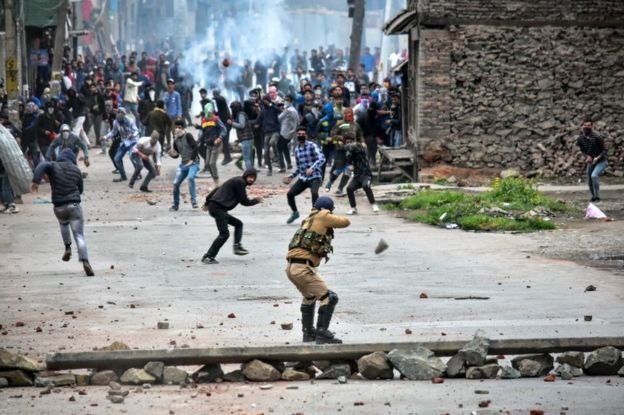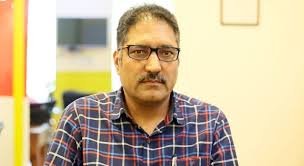
In early August, the government of Narendra Modi, India’s recently reelected Hindu-nationalist prime minister, moved troops into the Kashmir Valley, which is majority-Muslim, then cut the region off. The internet and landlines went down; TV channels were taken off the air. Prominent local politicians were detained. Without consultation, Modi revoked the special autonomy Kashmir has long enjoyed under a provision of India’s Constitution, and split the wider Jammu and Kashmir state into two territories subject to governance by New Delhi. Since then, the area has been on lockdown. Yesterday, during the Muslim festival of Eid al-Adha, the streets were mostly empty, and mosques were mostly closed.
Practicing journalism has never been easy in the Kashmir Valley, a conflict-torn region whose status has long been contested between India and neighboring Pakistan. In the past nine days, it’s become almost impossible. Yet local newspapers have persisted in their efforts to keep their readers informed. Their journalists “have no access to the news wires or social media,” Sameer Yasir and Jeffrey Gettleman write for The New York Times. “They cannot fact check anything online or make phone calls. They do their work the old-fashioned way, with notebooks and pens.” Many reporters, unable to go home because of checkpoints, have slept in their newsrooms; one, Raja Mohi-ud-din, has been waking daily at 2am to drive to his paper’s printing facilities, where he manually uploads and prints each edition himself. Only about six of Kashmir’s 50 newspapers have kept printing through the blackout, and those titles are running slender issues; nonetheless, Kashmiris, starved for information, quickly buy up the available copies, then hand them off to friends and neighbors.
The Indian government has said it won’t take action against those outlets that are still producing a paper. But, as Yasir and Gettleman note, those publications will eventually run out of newsprint and ink. And according to reports coming out of Kashmir, agents of the Indian state have suppressed journalistic activities in recent days. Last week, an anonymous local editor told the Committee to Protect Journalists that reporters’ movements—and their abilities to take photos and videos—have been restricted. The editor had been among a group to be “thrashed” by police officers after a photographer took a picture of a barricade; officers photographed journalists’ ID cards and license plates, and confiscated cameras and phones to delete files. Similar accounts have since emerged.
It’s not just local outlets that have been affected—the communications blackout and restrictions on the press have hampered national and international media, too. Last week, an anonymous foreign correspondent told Al Jazeera that police demanded she leave Kashmir ahead of the clampdown. Major outlets have run dispatches from inside Kashmir, but with difficulty; per CPJ, some reporters resorted to putting photos, including screenshots of their articles, on flash drives, then handing them to people who were leaving the region. As Muzaffar Raina, a journalist with India’s Telegraph newspaper, wrote last week, “The Srinagar dateline has never been so elusive before.” (Srinagar is the largest city in Kashmir.) Muzamil Jaleel, of The Indian Express, wrote on Facebook: “Kashmir has been turned invisible even inside Kashmir.”
The problem has been exacerbated by misinformation flowing from New Delhi. Officials have consistently denied reports of unrest in Kashmir, despite clear evidence to the contrary. Reuters and the BBC ran stories about a massive protest in the region on Friday; both outlets reported that the authorities used tear gas to disperse protesters. The BBC shared a video that appears to show police opening fire, yet the government continues to deny that shots were fired. When asked about the video yesterday, a senior official “grew irritated,” Yasir and Gettleman report. According to some Indian journalists, officials have handpicked certain correspondents in Kashmir and allowed them to access WiFi; most remain cut off.
On Saturday, Anuradha Bhasin, editor of Kashmir Times, filed a challenge against the government at India’s Supreme Court; the restrictions on the press, she claims, violate the right to free expression, and thus the constitution. Whether she wins or not, Bhasin’s broader argument is correct. Modi’s blackout doesn’t just injure Kashmiri journalists and citizens; it violates the world’s right to know about his government’s increasingly inflammatory maneuvers.
A worrying climate, part I: According to The Kashmir Walla, police arrested Qazi Shibli, a journalist and editor with news website The Kashmiriyat, in late July, days before the crackdown began. Shibli is reportedly being held in relation to tweets about troop movements in the region. Aasif Sultan, a reporter with the Kashmir Narrator, has been in prison in the region for a year in connection with a story he wrote about a local militant.

A worrying climate, part II: Earlier this year, Aliya Iftikhar reported for CJR from inside Kashmir, where she followed up on the unsolved assassination, in 2018, of Shujaat Bukhari, the founding editor of Rising Kashmir. Journalists such as Bukhari have long been caught in Kashmir’s conflict: “They are under pressure from Indian state authorities, as well as separatist groups, to publish biased coverage serving opposing agendas,” Iftikhar writes. Iftikhar discussed her piece with Kyle Pope, CJR’s editor and publisher, on our podcast, The Kicker.
A worrying climate, part III: While its circumstances are unprecedented, the current blackout isn’t anything new—according to Foreign Policy, Indian officials already blocked the internet in Jammu and Kashmir 53 times this year. India is the world leader in internet shutdowns: between 2016 and 2018, it recorded more of them than Pakistan, Iraq, Syria, Ethiopia, and Iran combined.
The celeb angle: On Saturday, at a convention in LA, a Pakistani woman assailed Priyanka Chopra, an Indian actress, over her past supportive tweets of the Indian armed forces. “War is not something that I am really fond of, but I am patriotic,” Chopra replied. The confrontation made global news. In response, the rapper Himanshu Suri, who now works for Spotify, tweeted: “The press will be more likely to cover Kashmir via this Priyanka Chopra story than they have been since India more unabashedly started violating the human rights of Kashmiris.”–Courtesy: Columbia Journalism Review

The High Asia Herald is a member of High Asia Media Group — a window to High Asia and Central Asia
